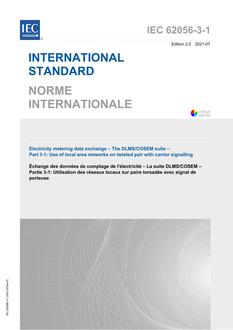This part of IEC 62056 describes two sets of profiles: the first set of profiles allows a bidirectional communication between a client and a server. This set of profiles is made of three profiles allowing local bus data exchange with stations either energized or not. For nonenergized stations, the bus supplies energy for data exchange. Three different profiles are
supported:
– base profile: this three-layer profile provides remote communication services;
NOTE 1 This first profile was published in IEC 61142:1993 and became known as the Euridis standard.
– profile with DLMS: this profile allows using DLMS services as specified in IEC 61334-4-41;
NOTE 2 This second profile was published in IEC 62056-31:1999.
– profile with DLMS/COSEM: this profile allows using the DLMS/COSEM Application layer and the COSEM object model as specified in IEC 62056-5-3 and in IEC 62056-6-2 respectively.
The three profiles use the same physical layer and they are fully compatible, meaning that devices implementing any of these profiles can be operated on the same bus. The transmission medium is twisted pair using carrier signalling and it is known as the Euridis Bus.
The second set of profiles allows unidirectional communication between a given Energy Metering device and a Customer Energy Management System. This second set is made up of three profiles.
Subclause 4.2.1 to Clause 8 included specify the bidirectional communication using twisted pair signalling and Clause 9 to 9.5 the unidirectional communication using twisted pair signalling.
Product Details
- Edition:
- 2.0
- Published:
- 07/01/2021
- ISBN(s):
- 9782832299401
- Number of Pages:
- 262
- File Size:
- 1 file , 4.6 MB
- Note:
- This product is unavailable in Belarus, Russia, Ukraine
